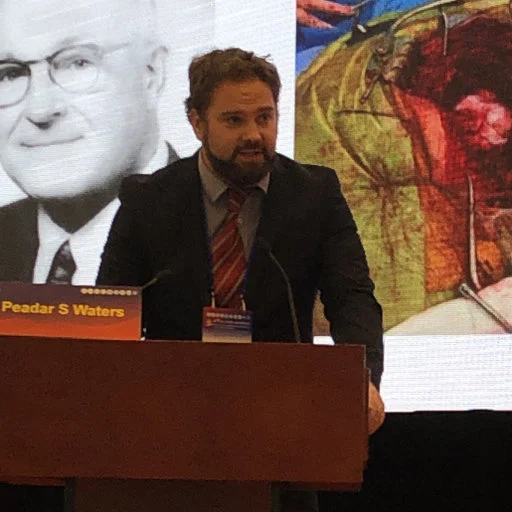Mr Peadar S. Waters
Mr Peadar S. Waters
Profile
Graduate: National University of Ireland Galway 2008.
Post Graduate: Western basic surgical training scheme and Irish Higher Surgical Training scheme.
Academia: MD NUIG 2013 (research) and MSc (clinical education) from NUIG (2013). Clinical colorectal fellowship: (2018) in Robotic, Pelvic exenteration and cytoreductive surgery in Department of Colorectal Surgical oncology, Peter MacCallum Cancer Centre, Melbourne, Australia, followed by a surgical oncology fellowship at Department of Surgery, Royal Brisbane and Women's Hospital Brisbane, Queensland, Australia (2019).
Consultant Posts: Consultant Colorectal Surgeon, Peter MacCallum Cancer Centre, Melbourne (2020). Minimally invasive surgery such as Robotic/Laparoscopic surgery, TaTME (Transanal total mesorectal excision), TAMIS (Transanal minimally invasive surgery), recurrent malignancy, exenterative surgery and cytoreductive surgery with HIPEC are primary interests. Appointed Consultant General and Colorectal Surgeon in Cork University Hospitals, Cork, Ireland, January 2022. Also performs endoscopy and surgery at Mallow General Hospital and Bantry General Hospital, Ireland.
General Surgery:
- Laparoscopic/open inguinal hernia repair
- Incisional hernia - robotic, laparoscopic and open
- Femoral hernia
- Recurrent hernias
- Parastomal hernia repair
- Laparoscopic cholecystectomy (Gallbladder/gallstone removal)
- Small bowel disease/tumours
- Excision of skin/subcutaneous lesions/lipomas/Ingrown toenails
Colorectal Surgery:
- Robotic Colorectal Surgery/Laparoscopic Colorectal Surgery
- Transanal Polyp and Cancer Surgery (TEMS/TAMIS/TaTME)
- Colorectal Cancer/Anal Cancer
- Inflammatory bowel disease (colitis and Crohn's)
- Colonic polyps/Polyposis syndromes
- Diverticular disease
- Stoma Surgery
- Haemorrhoids - Banding, Transanal Dearterialisation of haemorrhoids, open excision
- Pilonidal surgery, Anal fissures, Anal fistulas
- Minor anal conditions: skin tags, fibroepithelial polyps, warts and pruritus ani.
- Pelvic floor disorders including faecal incontinence, rectal prolapse and constipation.
